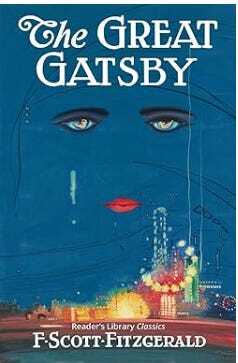Gatsby at 100: Life lessons, lost loves, and a bit of Ron Paul

Are you ready to feel older? Like, way older? I first read The Great Gatsby in 2007, when it was just 82 years old. A lot has changed since then. For one, very, very few people seemed to take Ron Paul seriously, despite the fact he was about to get more than a few predictions right, like the housing crisis.
The Libertarian Book Reviewer is a reader-supported publication. To receive new posts and support my work, consider becoming a free or paid subscriber.
Alternative media was rather niche. Beyond niche, really. Cell phones were just beginning to take the form we’ve come to know them today. And the only thing I cared about during my junior year of high school involved hitting the weight room after spending sixth period lobbing paper wads when my Geometry teacher had her back turned. And then laughing when she kicked my friend out of class for the ‘crime.’
But at least I found a gem in The Great Gatsby, a novel that didn’t become so popular in the American lexicon until the 1940s when the U.S. military included it in Armed Services Editions during WWII, not long after F. Scott Fitzgerald died of a heart attack. Fitzgerald may’ve thought the book failed, but 100 years later, it’s safe to say The Great Gatsby is still going strong.
If you haven’t yet read The Great Gatsby, do yourself a favor…Even if tragedy isn’t your genre of choice, pick up this book and read it. I rarely read the genre myself, but it’s more than worth it. A lot of life lessons, really. Let me jot down a few:
The grass isn’t always greenerNo, it ain’t. Have you ever thought of leaving your hometown for greener pastures? For me, it involved living in the city as opposed to the village and small-city outskirts I grew up in. For Nick Carraway, it meant moving from the Midwest to Long Island.
Carraway learned that he wasn’t cut out for life in the Northeast, much like the Buchanans and Gatsby. Sickened from his experience, he moved back to the Midwest.
As for me, city life was miserable. It was like being trapped in a cage. Traffic was always bad. Buildings making up the skyline, so breathtaking from the outside, were nothing but cold metal and weathered brick buildings from the inside. And everyone seemed like they were in a hurry.
Never obsess over a past loverMy friends laugh at the number of female K-pop idols I crush on. But moving to Korea to be near the scene isn’t an option. Unfortunately for James Gatz, his love for Daisy Buchanan blinded him, and he did everything he could to try and win her over.
But then again, this one may have stemmed from F. Scott Fitzgerald’s obsession over Ginevra King. King married an ex-polo player, Bill Mitchell, thanks to her father allegedly pre-arranging the marriage. In the novel, Tom Buchanan is an ex-football star at Yale, so there are a lot of correlations here.
Yeah, it’s much better to pull a Fitzgerald and write about these things as opposed to pulling a Gatsby and going into full creeper mode. And yes, before you ask, there’s a good reason for a survival thriller trilogy I’ve been working on for about a year and a half now under a slightly different pen name (T.C. Marti) that involves a K-pop idol and a sports writer in lead roles. Just sayin’...
Thanks for reading The Libertarian Book Reviewer! This post is public so feel free to share it.
Don’t have extramarital affairsGoodness, that Seinfeld episode when an engaged George Costanza tried to date Marissa Tomei just popped into my head. Anyway, if you’ve read The Great Gatsby, you’ll know where I’m going with this one.
We got Tom Buchanan seeing Myrtle Wilson behind her husband’s, whose name is ironically George, back. Then, not long before Jay Gatsby has Daisy in his crosshairs, he befriends and relies on Nick to get what he wants. And the next thing you know, two extramarital affairs are going on here. That we know about, anyway.
Listen, there is a really, really easy way to avoid this - Just sign your first-round draft pick to a lifetime contract that includes incentives like date nights and spending time sharing common interests.
And you can bet that if I ever get married, I doubt I’ll be writing about sports writers and K-pop idols facing death-defying scenarios…unless I end up ‘pulling a Travis Kelce,’ K-pop style.
Always remember that the government is almost never right - and I’m being generousProbably the most important life lesson here. But you can’t help but ask: Would Gatsby and Daisy have ended up getting married if Wilson never inched America closer to its current role as an empire? We’ll never know, but the odds may’ve been in their favor.
Tom did his research on Gatsby and discovered he was a bootlegger. Of course, this took place during the days of prohibition, both when the novel was written and in 1922, the year in which it took place.
This isn’t to say Gatsby wouldn’t have ended up making his fortune by engaging in illegal activity some other way. If that activity should actually be illegal, that is. But this revelation was the final nail in the coffin for Daisy staying with Tom. It’s crazy to think that bootlegging something like alcohol was looked at in such a way these days.
But then again, I’d said the same thing about the entire Drug War for a while, and so have others. If it hasn’t been won yet, it probably never will be.
Anyway, everything in this section is more speculative, but I hope the message at least sinks in: Just because the government does, supports, or enforces something, it can cause quite the butterfly effect.




